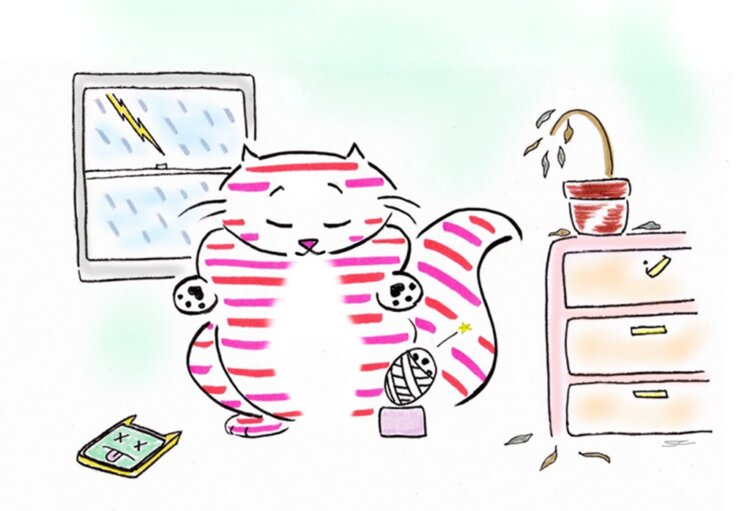
I was standing in the center of a shopping mall—well, not really standing as much as listing to one side. A flare-up of tendinitis in one hip had me leaning on the other leg in a highly wonky yoga pose. Unfortunately, the standing leg’s foot was bound with tape to keep some very impressive plantar fasciitis in check. The leg imbalance thing was causing an old knee injury to start complaining again. I was standing—listing—because I’d gotten tired of limping around the mall while I waited for my turn at the Apple store to find out why both my laptop and my phone had decided to become expensive paperweights.
This is the point where I, and anyone else, would say, “Come on now, you don’t have it that bad. There are a lot of people out there who are going through much worse.” Absolutely, positively correct. Even in that moment, I could’ve made a gratitude list a hundred items long—and two very good reasons why I wouldn’t.
Over years of spiritual study, including basic faith-based optimism, two lessons have served me and others well in varying degrees of rough times. One is that I don’t stand on the shoulders of those who have it really bad so that I can feel better about myself. And two, we don’t always have to look at the bright side. It is okay to not be okay.
RELATED: You don’t have to do yoga to do yoga
It’s easier to throw your arms and mind around these concepts when people are going through very challenging events, like illness and death. Even then, well-meaning folks will look for ways to make them feel better—ways that often make things worse. When my friend Francesco became paralyzed after a diving accident, people tried to console him by saying that everything happens for a reason. “What possible reason could there be,” he asked, “to justify me becoming quadriplegic?”
I wondered the same thing when people tried to comfort me after my friend Marnie died. She’d contracted a rare form of cancer and passed away a week before her 35th birthday. People told her grief-wrenched family and friends everything happens for a reason, and also that she was in a better place. Possibly true, but definitely not helpful.
I didn’t fault these good people one bit. They were trying to comfort Francesco, and me, and anyone else who has heard these things. The people who say them are also trying to find their own footing when life becomes slippery and random, as though a river with a strong current that they were navigating pretty well has suddenly frozen. It’s not easy to understand how someone can be healthy one moment and, in the next, drastically changed, or gone forever. And so we grasp for any explanation that will help it make sense, and possibly help us feel better.
If that works for you, especially in times of extreme life upheaval, this is a gift. Hold it close and let it help heal you. And if it doesn’t work, allow yourself to experience the freedom that comes with another spiritual saying: “This sucks.”
The examples I gave are extreme. There are a thousand paper cuts before we confront mortality, days when your phone and your computer, and your hip and your foot and your knee—even your blessed knee!!—give out. When everything that has been operating so perfectly now, suddenly, does not work. The (aching) knee-jerk reaction we’ve been taught to think is, “There are people out there who have it much worse.”
Permission slip: You don’t have to go there. Those people who have it much worse would really appreciate you not feeling better at their expense. They would love your compassion, your empathy, your direct help if you know them personally, your contribution of time or a donation if you don’t know them. The misfortune of others, used as a comparison, is a tool to teach empathy and perspective to children. Intelligent adults can do better than that.
How? By understanding context. Within the context of my situation, I understood that, though pained and seriously vexed, I had it good. I had a phone and a laptop, and a knee and a foot and all that, malfunctioning though they might be. Within the context, I was also allowed to think, You know what? I am just not having a great day, that’s all. I don’t have to look at the bright side right now. I don’t want to turn that frown upside down. It’s not a big deal. I’m just not that happy right now.
This did not give me license to ruin anyone else’s day; I kept my frown to myself. I expressed gratitude to the tech genius who diagnosed my device issues and the doctor who diagnosed my physical issues. I may not have looked at the bright side, but I didn’t join the dark side. I am still a spiritual Jedi in training. I don’t think Master Yoda would’ve muttered an exasperated “Hmf” at me.
If you know someone who’s having a bad day, or going through a rough time, there’s a way you can make them feel better: just be there for them. Give them your ears, hold their hand. Let them cry. Ask what you can do. Tell them what you will do. You, more than any platitude, are what they need.
When it’s you who’s having the crap day or rough time, here’s my deep spiritual pronouncement: Sometimes, things just suck. It’s nobody’s fault. No one is punishing you. It’s not bad karma. There are great joys in life, and there are times when our hearts break, and there’s everything in between. Each of us gets to experience all of it. Everyone truly understands where you’re coming from and how you feel. We are all connected in the cycle of love, loss, and love born anew. We carry on, and we carry each other.
That, my beautiful friends, is the true bright side.
Suzan Colón is the author of Yoga Mind: Journey Beyond the Physical, 30 Days to Enhance Your Practice and Revolutionize Your Life From the Inside Out.


Grok Nation Comment Policy
We welcome thoughtful, grokky comments—keep your negativity and spam to yourself. Please read our Comment Policy before commenting.